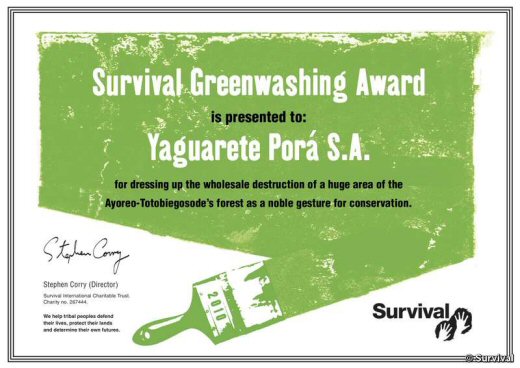No need for comment, straight repost with thanks to Fred.

How do you greenwash a large airforce base? A base that is responsible for bombing nearby countries, and which was built on an island you confiscated from residents who are now living in exile on the other side of the world?
Easy. You announce the creation of a giant nature reserve which will be off-limits to its former inhabitants. Not to the military, of course. That might create complications. But the people-free zone will cover the islands and oceans all around. Then, if you’re really clever, you get the world’s premier network of conservation scientists to endorse your plan.
That’s what happened last week.
The Foreign Office is currently “consulting” on the establishment of a marine protected area covering the Chagos archipelago, a large swathe of coral islands across the Indian Ocean that Britain neglected to hand back to the locals when it abandoned most of the rest of its empire east of Suez in the 1960s.
This is bad news for the Chagossians, who were removed from the islands by British naval vessels almost half a century ago, so that the US could establish a large air base on the largest of the islands, Diego Garcia. The Chagossians have always wanted to return, and two years ago they published detailed plans to go back to some of the more distant islands of the archipelago.
But successive British governments have said this can never be. Foreign secretary David Miliband appears intent on cementing this position by creating a protected area where Chagossians would not be allowed to live. Americans will be welcome, of course. The consultation document (pdf) notes coyly that “it may be necessary to consider the exclusion [from the protected area] of Diego Garcia and its territorial waters.”
Last week, the International Union for the Conservation of Nature (IUCN) endorsed the plan despite, as New Scientist magazine has revealed, angry dissent from its own legal advisers.
The conservation case for protecting the Chagos archipelago is undoubtedly strong. It is one of the most pristine coral reef systems in the world. Announcing his plan last November, Miliband said: “This is a remarkable opportunity for the UK to create one of the world’s largest marine protected areas and double the global coverage of the world’s oceans benefiting from full protection.”
More than 10,000 British greens have signed in support of the move to create “Britain’s [sic] Great Barrier Reef”. The campaign is backed by the Chagos Environment Network, a coalition that includes Kew Gardens, London Zoo, the RSPB, the Royal Society and the Marine Conservation Society.
The question is whether Britain has any legal or moral right to do this unilaterally.
What about the claims of the 4,000-plus Chagossian exiles – many of them live close to Gatwick airport in readiness for their return home? The glossy pamphlet (pdf) encouraging people to support the conservation plan is silent on their expulsion and desire to return.
Most international lawyers believe the expulsion was a breach of international law, and the exiles should be allowed to return forthwith. Robin Cook is the only British foreign secretary to have agreed with them. Under the conservation plan, the only way any of them could return would be as employees of the park.
What about the fact that Britain accepts that neighbouring Mauritius should have sovereignty over Chagos when the Brits and Americans no longer need it? Protests from the Mauritian government about the plan last week fell on deaf ears.
The Chagos Conservation Trust says: “Strong support for this initiative for conservation was expressed by both Chagossian leaders who spoke at [a] meeting on 9 April 2009 at The Royal Society. The creation of a protected area would clearly be without prejudice to the outcome of the pending legal case [in the European Court of Human Rights] in regard to Chagos Islanders and the arrangements for the protected area could be modified if necessary in the light of any change in circumstances.”
Indeed so. The law would have to be obeyed. But some environmental lawyers see the conservation plan as an attempt to greenwash the status quo.
There is a frightful row going on at the IUCN over the decision of its executive director Julia Marton-Lefevre last week to side with Britain over the creation of the marine protected area. Klaus Bosselmann, the chair of the IUCN’s ethics group, part of its Commission on Environmental Law, wrote that it “violates IUCN’s own commitments towards sustainability” because the plan would “invalidate… the right of the Chagos Islanders to return.”
Bosselmann, director of the New Zealand Centre for Environmental Law, told the Guardian that “concern for ecological integrity and human and indigenous rights have to be mutually reinforcing.” For IUCN to back the permanent exclusion of the Chagossians from the islands “is severely unethical and against everything the international conservation movement stands for.”
Marton-Lefevre denied this. She called for consultation with “all stakeholders”, including the Chagossians. And she said the IUCN’s position “in no way takes or endorses a position with regard to the sovereignty of the archipelago.”
At least we are talking about Chagos now. Back in 1994, when Britain published the first biodiversity action plan for its surviving specks of empire, it literally removed the zone, known as the British Indian Ocean Territory, from the map.
Now, rather than airbrushing out Chagos, the mandarins want to paint it green. Conservation seems to be the last hurrah of the British Empire.
(From http://www.guardian.co.uk/environment/2010/feb/18/chagos-nature-reserve-greenwash)












